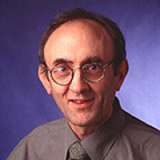Hematopoietics

Gay Crooks, MBBS
Human hematopoietic stem cells, lymphopoiesis and transplantation
Dr Crooks research program was founded on the question of how to identify and functionally define human hematopoietic stem and progenitor cells. This central theme has reached over time into three related areas, 1. the characterization and manipulation of human hematopoietic stem cells and lymphoid progenitors in cord blood, bone marrow and thymus, 2. mechanisms of thymic reconstitution after bone marrow transplantation, and 3. hematopoiesis from human embryonic stem cells. Specific areas of current investigation include regulation of lymphoid commitment in human hematopoiesis, VEGF-mediated thymic cross-talk, thymic graft re-engineering, and intrinsic and extrinsic regulation of hematopoiesis from human pluripotent stem cells. More Info >>

Sheeja Pullarkat, MD
Dr. Pullarkat's research interests are in biology of hematopoietic malignancies. Her current projects include examining the role of chemokine receptor expression in determining the clinical presentation of leukemias and lymphomas. Her research specifically examines how chemokine receptor expression by neoplastic cells contributes to specific organ involvement and prognosis. She also works on understanding the pathophysiology of mast cell disorders especially systemic mastocytosis occurring in association with hematologic malignancies. This includes examining the role played by neoplastic mast cells in the biology and outcome of acute myeloid leukemia. Her research also focuses on understanding the epidemiology of Burkitts lymphoma and the role of downstream genetic markers in the clinical presentation and prognosis. More Info >>

Dinesh Rao, MD, PhD
Regulation of hematopoietic development and cancer by non-coding RNA
Broadly speaking, we want to understand the physiology and pathology of non-coding RNA and their interactors in hematopoiesis. Gene expression is a key component of regulating hematopoiesis, and many non-coding RNAs have some effect on gene expression. One subset of non-coding RNA, microRNAs, regulate gene expression and are thought, in most cases, to repress mRNA translation or cause degradation. More Info >>

Jonathan Said, MD
Pathologic basis of neoplastic disease
The laboratory has a number of ongoing projects related to: Use of tumor markers to characterize neoplastic proliferations. These include use of immunohistochemistry and in-situ hybridization to identify tumor antigens and gene products associated with neoplastic transformation and tumor progression. Mechanisms of lymphomagenesis including the role of dendritic cells in the pathogenesis of lymphomas... Continued >>

Sophie Song, MD, PhD
Dr. Song has accumulated extensive diagnostic and multidisciplinary expertise in managing hematolymphoid disorders. In addition, she has become an internationally recognized expert in clinical flow cytometry. More Info >>